Scaffolds for Student Agency
CompetencyWorks Blog
Tommy Wolfe shares how he has adopted competency-based practices in his high-school science classroom. His first and second blog posts address how competencies influence teacher practice.
I am a high school science teacher who is passionate about competency-based education, and although the school that I teach in is not competency-based, I have worked to develop competency-based practices in my own classroom. In this blog post, I will share some of the structures I have found most helpful in developing my own capacity for competency-based teaching, specifically as it relates to fostering student agency.
Competency-based education deliberately aims for learners to develop agency. Traditionally, learning in school can be described as a “slow drip,” where students are dependent on the teacher as gatekeeper to unveil the next droplet of information. This makes it difficult for the student to develop ownership of learning and agency. Teachers can give students autonomy or choice, but agency is a skill that requires practice (Sixtrud & Johnson, 2019).
Inspired by the educators from my research, I have created resources I call scaffolds for agency that I use to support my students’ development of agency. These scaffolds for agency repeat themselves throughout units, so students have practice using them and become more independent with them as the year progresses.
Scaffold for Agency #1: Unit Guides
A unit guide is a page on my website that provides all the expectations and resources for a particular project or unit. Learners with a high level of agency could navigate the resources and accomplish the performance task(s) on their own—after all, that is what I would ultimately want for my students to be able to do upon graduating. Of course, my freshman students are still developing their agency and need assistance, so the unit guide helps me better assume a role of facilitator as I help them navigate resources on the unit guide and provide them with guidance and feedback. I still have a schedule with learning objectives for each day and collective activities that might resemble a typical class. However, the unit guide removes me as the gatekeeper of knowledge and helps me plan lessons that require students to employ greater agency.
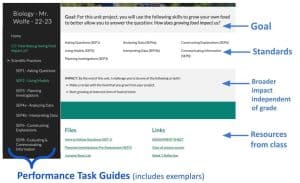
Scaffold for Agency #2: Performance Task Guides
My website includes a menu of performance task guides for the scientific practices we assess as part of our proficiency-based grading standards.Performance task guides are website pages or presentation slides that act as “mini books” for each scientific practice. As you can see below, each performance task guide includes information that answers five questions.
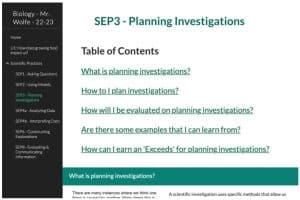
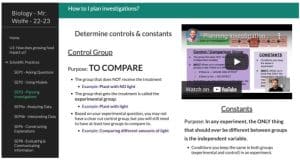
These performance task guides took me some time to make, but because the skills we use repeat themselves in each unit, these resources are used by students the entire year. Frequently throughout the year, students ask me, “Mr. Wolfe, what’s the difference between a control and constant again?” and I’ll direct them to the Planning Investigations Performance Task Guide. With this resource students realize they can answer the question themselves, and I am happy to provide further guidance if they are still struggling with the concepts. As the year goes on, students become more familiar and more confident in referencing the performance task guides on their own.
Scaffold for Agency #3: Exemplars
I have been creating exemplars so students can see what a final product for a performance task may look like. I have also started annotating exemplars to point out exactly where each indicator for a skill is accomplished. Students have found exemplars to be particularly useful, because they provide a tangible expectation and allow them to evaluate their own work in comparison.
Below are two exemplars for the standard Communicating Information (SEP8) that also demonstrate how the same skill can be accomplished through two different formats—a paper and an infographic. Students used these exemplars on diabetes to help them transfer the skill to their project on cancer that explored the question: “Is cancer influenced more by genes or environment?”
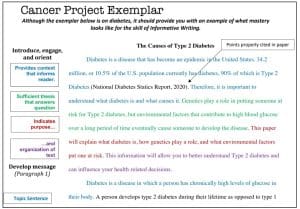
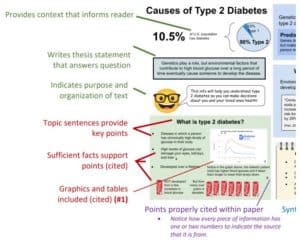
Exemplars have also been helpful for me in learning to teach new skills. For instance, last year, I incorporated the Communicating Information standard into my class, and by making my own exemplar I had a much better grasp of what I was expecting from students and how to teach this skill.
Scaffold for Agency #4: Skill Card
The skill card is a resource designed to promote a greater ownership of learning and intrinsic motivation. The skill card shows all the standards that students will need to master for my first-semester biology course, and they fill in a box when they have accomplished a skill at a particular level. The skill card intends to provide students with the bigger picture of the year and give them the space and time to reflect and set goals. In addition, following what the learning sciences say on intrinsic motivation (Sturgis & Casey, 2018 ), even by accomplishing Level 2 skills, students experience small victories of competence that can motivate them to keep going and improve.
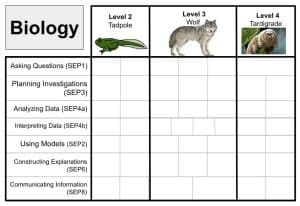
Simply giving students choice and autonomy will not automatically ensure learning and agency. I have found the scaffolds for agency—the unit guides, performance task guides, exemplars, and skill cards described in this post—to be helpful structures that can support the development of student agency. These scaffolds for agency also provide a framework for me as the teacher to design lessons that allow me to be more of a facilitator.
Sources:
Stixrud, W., & Johnson, N. (2019). The self-driven child: The science and sense of giving your kids more control over their lives. Penguin.
Sturgis, C., & Casey, K. (2018). Quality principles for competency-based education. INACOL, 128.
Learn More
- Competencies Help Bridge the Gap Between Traditional and Project-based Learning
- How Competencies Influence Teacher Practice
- Teacher Insights on Developing Competency-Based Practices in the Classroom
 Tommy Wolfe is a high school science teacher at Adlai E. Stevenson High School in Lincolnshire, IL and is an Adjunct Professor acting as the Competency-Based Lead for DePaul University’s Office of Innovative Professional Learning in Chicago, IL. He holds a B.S. in Integrative Biology, a B.S. in Psychology, an M.Ed in Curriculum and Instruction from the University of Illinois at Urbana Champaign and a Ph.D in Educational Leadership from DePaul University.
Tommy Wolfe is a high school science teacher at Adlai E. Stevenson High School in Lincolnshire, IL and is an Adjunct Professor acting as the Competency-Based Lead for DePaul University’s Office of Innovative Professional Learning in Chicago, IL. He holds a B.S. in Integrative Biology, a B.S. in Psychology, an M.Ed in Curriculum and Instruction from the University of Illinois at Urbana Champaign and a Ph.D in Educational Leadership from DePaul University.